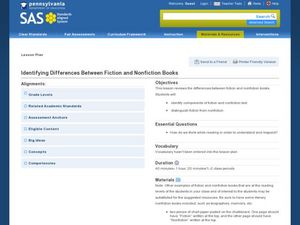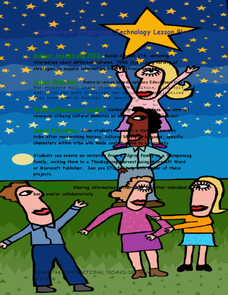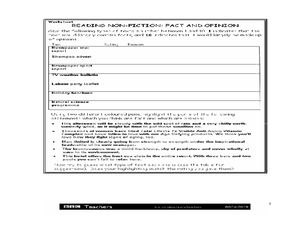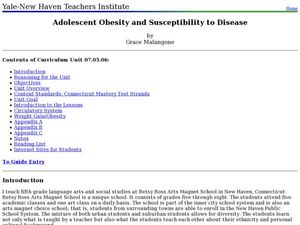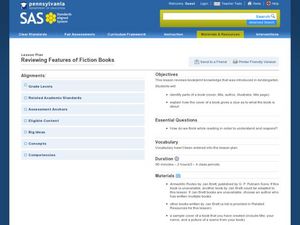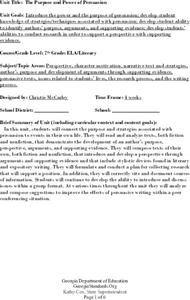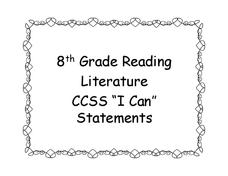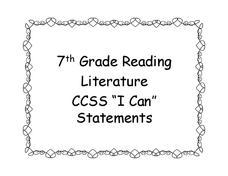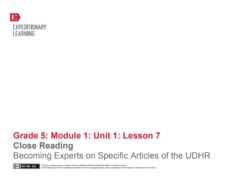Curated OER
Analyzing Short Biographies to Discover Characteristics of Biographical Writing
Students read short biographies on Abraham Lincoln from various artists. Using the texts, they identify the subject of the biography and discuss whether or not illustrations contribute to a biography. They research specific information...
Curated OER
Can You Get the Signal?
What is a signal word? Recognizing these words is an important step in both reading and writing formal text. Review a list of signal words (provided and organized into specific categories), and then have your class play a game to...
Curated OER
Guided Reading With Fish Print
Students investigate the concept of reading comprehension using Fish Print. They practice reading skills with using picture clues, using context clues, and sight word recognition for simple sentences. The teacher guides the lesson with...
Curated OER
Space Food
What do astronauts eat in outer space? Kids can read an informational passage to learn about space food. The passage includes prompts that have learners identify the main idea and key details, then write a paragraph summarizing the text....
Curated OER
Flight Formation: The V's Have It!
Read, revisit, and reflect. Older elementary students summarize main idea 6using key details. They consider the V formation that birds fly in, summarize an informational text, and write critical thinking questions.
DePaul University
The Working Tools of Insects
The animal kingdom is full of interesting organisms that have unique ways of surviving. Children read about different insects that have special tools for building homes and protecting themselves. When finished, learners identify the main...
Curated OER
Identifying Differences Between Fiction and Nonfiction Books
Young scholars explore the differences between fiction and non-fiction book. In this genre study instructional activity, students read examples of fiction and non-fiction and identify the characteristics of each genre. Young scholars...
Curated OER
Native Americans
First graders explore the lifestyles of several North American tribes. They investigate about the homes, food, transportation, and daily living habits of each tribe. Pupils use a map to locate several Native American tribes in North...
Curated OER
Sound Devices in Poetry, Fiction and Nonfiction
Students examine the impact of sound devices in poetry. In this poetry lesson, students read the listed poems and identify uses of alliteration, repetition, consonance, rhythm, rhyme, and slang. Students discuss how sound devices enhance...
Curated OER
Literacy:Non-Fiction Stories
Third graders explore non-fiction stories. They follow along as the teacher reads a story. Students fill in words as the teacher reads to ensure they are following along. They discuss the text features found in the book and the features...
Curated OER
Reading: Non-Fiction Format
In this reading non-fiction worksheet, students examine various texts and complete a graphic organizer filling in information about features, columns, paragraph length, font, pictures/illustrations, and purpose of text.
Curated OER
Introducing Working Animals
Students identify ways humans and animals work together. In this animal welfare lesson, students read the text Hanni and Beth: Safe and Sound and define the term "working animals." Students investigate working animals by visiting various...
Curated OER
Reading Non-Fiction: Fact and Opinion
In this reading non-fiction worksheet, students complete a graphic organizer, rating on a scale of 1-10 whether given types of text would be more opinion or fact. Students then highlight parts of statements indicating fact or opinion.
Curated OER
Adolescent Obesity and Susceptibility to Disease
Students understand the importance of maintaining a healthy weight and good health. In this health lesson students read text then create their own pamphlet on the cardiovascular system, weight gain, treatments and health risks.
Curated OER
Reviewing Features of Fiction Books
Students identify the features of fiction books. In this genre study lesson, students are introduced to the book Armadillo Rodeo and identify the cover, title, author, illustrator and title page. Students discuss how the book cover gives...
Curated OER
The Purpose and Power of Persuasion
Seventh graders are introduced to and discuss the power of persuasion. After reading text, they identify the author's purpose, perspective and argument. They write their own fiction and non-fiction texts and develop a perspective after...
Curated OER
Ready, Set, Sum
Third graders summarize a piece of nonfiction text. After reviewing the correct way to read in order to summarize, 3rd graders independently read a nonfiction article. They write a summary paragraph using the three step process outlined...
Curated OER
Summing It All Up
Students summarize a selected piece of text nonfiction text. After reviewing the correct way to read silently, students read a nonfiction article. They write a summary paragraph using a concept map and the process outlined by the...
Curated OER
Summarization Know How
Students summarize a piece of text nonfiction text. After reviewing the correct way to read and summarize, students independently read a nonfiction article. They write a summary paragraph using the process outlined by the instructor...
Curated OER
Summarize What You Read
Third graders summarize a selected piece of nonfiction text. After reviewing the correct way to use a Venn diagram, 3rd graders read a nonfiction article. They write a summary paragraph using their Venn Diagram and the five-step process...
Curated OER
Exploring Prejudice and Text-to-Text Relationships
Tenth graders use the novel To Kill a Mockingbird to analyze relationships in society. In this literature analysis lesson, 10th graders participate in a shoe activity where they bring in one shoe belonging to someone they know and a...
Curriculum Corner
8th Grade ELA "I Can" Statement Posters
Eighth grades can master the ELA Common Core standards! Show your learners the connection between classroom activities and assignments and the standards with this set of "I Can" statement posters. Each standard has been rewritten as an...
Curriculum Corner
7th Grade ELA "I Can" Statement Posters
Help your seventh graders relate the ELA Common Core standards to their own learning with these "I Can" statement posters. Each standard has been translated into a statement that pupils can understand and placed on its own page for easy...
EngageNY
Close Reading: Becoming Experts on Specific Articles of the UDHR
A continuation of the previous lesson, which is part of a larger group of lessons on human rights (see additional materials). Here, in Lesson 7, your class will explore more articles from the Universal Declaration of Human Rights. After...
Other popular searches
- Nonfiction Text Features
- Nonfiction Text Structures
- Types of Nonfiction Text
- Features of Nonfiction Text
- Fiction and Nonfiction Text
- Nonfiction Text Elements
- Infer Nonfiction Text
- Parts of Nonfiction Text
- Summarizing Nonfiction Texts
- 6 Nonfiction Text Structure
- Inquiry and Nonfiction Text
- Reading Nonfiction Text








